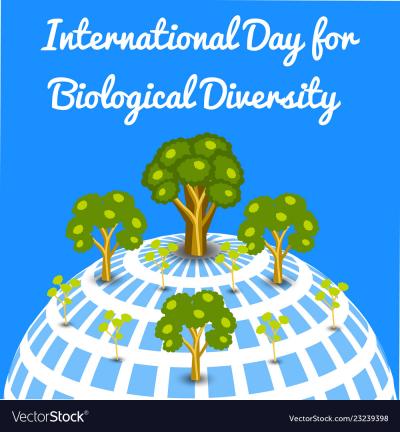
Biological diversity also known as Biodiversity describes the richness and variety of life on earth; it is the living fabric of our planet. It holds ecological and economic significance providing us with nourishment, housing, fuel, clothing and several other resources. It also extracts monetary benefits through tourism.
Biodiversity underpins human wellbeing in the present and in the future. Without it, life would not be sustained.
Biodiversity includes the number of different organisms and their relative frequencies in an ecosystem. It deals with nature’s variety, the biosphere, the variability among organisms at different level and also reflects the organization and interrelation of a plethora of plants, animals and humans.
However its rapid decline threatens nature and people alike, it is therefore very important to sustain this complex and important feature of our planet.
The United Nations, (UN), has proclaimed May 22, The International Day for Biological Diversity to increase understanding and awareness of biodiversity issues.
According to the UN, “As the global community is called to re-examine our relationship to the natural world, one thing is certain: despite all our technological advances we are completely dependent on healthy and vibrant ecosystems for our water, food, medicines, clothes, fuel, shelter and energy, just to name a few.
This year 2021, the theme is “We’re part of the solution”. This stresses the fact that our solutions are in nature and biodiversity remains the answer to several sustainable development challenges. From nature-based solutions to climate, health issues, food and water security, and sustainable livelihoods, biodiversity is the foundation upon which we can build back better.”
Almost all species on our planet are interconnected and are dependent on each other. For instance, a cattle feed on the grass. The cattle then provide manure which returns nutrients to the soil which then helps the grass to grow. When the cattle die, microbes/fungi decompose it thereby keeping the soil fertile.
This in turn helps many plants to grow which then provides food to different animals. This is just a simple example of biodiversity at play in an ecosystem.
When we explore different ecosystems we find innumerable such interactions. Countless such interactions have kept our planet sustainable and habitable for millions of years. As the biodiversity decreases, these interactions can weaken or even break and can harm all the species in an ecosystem.
From a human perspective, biodiversity has a glut of benefits. We, the people of cities and towns, for us wildlife is something that exists in televisions and computers. We may not realize it, but the air we breathe, food we eat, water we drink; the clothes we wear all ultimately depend on biodiversity.
Everybody knows that plants are important, for they provide oxygen. Many of us might not know that trees root systems prevent flooding. Trees also absorb air pollutants in cities. Wild animals such as spider monkeys and tropical tortoises also help in cleaning air as some trees depend on these fruit eaters to disperse their seeds.
Biodiversity contributes at least 40% to the world’s economy and 80% to the needs of the poor. Millions of people depend on biodiversity for their day-to-day livelihoods. For them their high-biodiversity ecosystem is a source of food, fuel, medicines and many other products made from natural materials which serves as a source of income.
Hundreds of industries also depend on biodiversity−agriculture, medical, pharmaceutical, fashion, tourism all depend on plants for their success. Biodiversity is a reservoir of resources which are useful for humans. Perfumes, fibers, rubber, resins are all derived from different plant species. Many plants have medicinal value. Aspirin, one of the most popular pain relievers was originally made from bark of willow trees. Rosy periwinkle, a flower that grows on the island Madagascar can treat some forms of cancer.
According to the Centre for Biodiversity and Conservation, (CBC), “biodiversity also helps in combating climate change. 11% of global greenhouse gases are emitted because of deforestation, so conserving forests would stop the release of these gases into the atmosphere. Trees and plants store carbon in their tissue which makes it even more important to protect them. Ecosystems like mangroves, are particularly good at keeping carbon out of the atmosphere by storing it.
“Forests and wetland ecosystems provide crucial buffers to extreme storms and flooding related to climate change. These ecosystems function best when all the pieces of biodiversity are intact.
Many researches prove that disease outbreaks are closely linked to the loss of biodiversity. 70% of emerging viral diseases have spread from animals to humans.”
With the ever increasing urbanization, agriculture and wildlife trade, humans are venturing deeper into forests. This is exposing humans to the many diseases that wild animals in these forests may carry such as the zoonotic COVID-19.
With COVID-19, we’ve seen that diseases can damage not only human health, but also the global economy. By protecting biodiversity, we can prevent future pandemics from claiming lives and money.
Deforestation also accelerates climate change, which may boost the spread of disease by allowing vectors like mosquitoes to extend their reach to new regions and infect vulnerable populations of humans.
Biodiversity also helps in preserving social and cultural diversity and identity. Species are integral to religious, cultural and national identities. All major religions include elements of nature.
Also, preserving biodiversity is ethically and morally important for us. Humans are not the only species existing on this planet. All organisms have right to live and we should not overhunt and overexploit other species
Over the last century, humans have come to dominate the planet, causing rapid ecosystem change and massive loss of biodiversity across the planet
While the Earth has always experienced changes and extinctions, today they are occurring at an unprecedented rate. Major direct threats to biodiversity include habitat loss and fragmentation, unsustainable resource use, indiscriminate hunting, pollution, and global climate change.
Now it is time to embrace biodiversity, to cherish and conserve it at all cost if we humans are to survive.
Thus, the UN calls on member states to intensify their efforts to halt biodiversity loss through understanding, appreciating, safeguarding and using biodiversity sustainably.
To halt or reverse this decline, it is therefore vital to transform people’s roles, actions and relationships with biodiversity, bearing in mind that the extinction of one species may cause the extinction of another






















